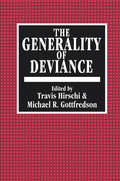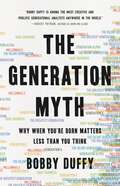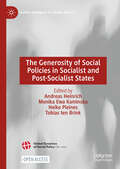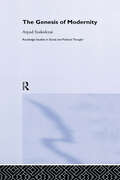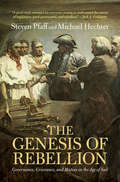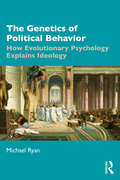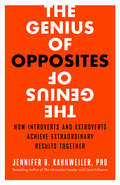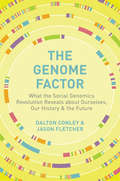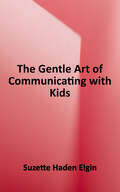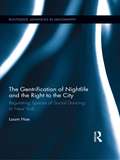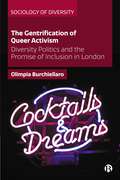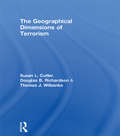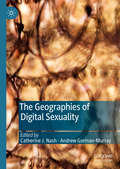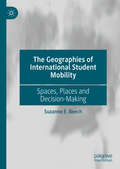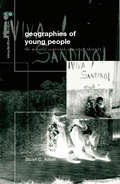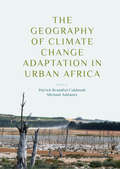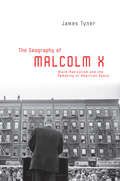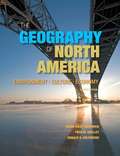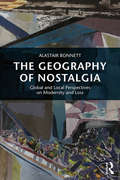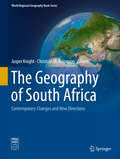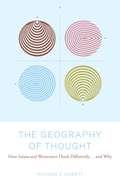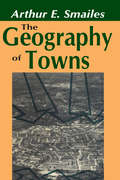- Table View
- List View
The Generality of Deviance
by Michael R. Gottfredson Travis HirschiFirst Published in 2018. Routledge is an imprint of Taylor & Francis, an Informa company.
The Generation Myth: Why When You're Born Matters Less Than You Think
by Bobby DuffyMillennials, Baby Boomers, Gen Z—we like to define people by when they were born, but an acclaimed social researcher explains why we shouldn't.Boomers are narcissists. Millennials are spoiled. Gen Zers are lazy. We assume people born around the same time have basically the same values. It makes for good headlines, but is it true?Bobby Duffy has spent years studying generational distinctions. In The Generation Myth, he argues that our generational identities are not fixed but fluid, reforming throughout our lives. Based on an analysis of what over three million people really think about homeownership, sex, well-being, and more, Duffy offers a new model for understanding how generations form, how they shape societies, and why generational differences aren&’t as sharp as we think.The Generation Myth is a vital rejoinder to alarmist worries about generational warfare and social decline. The kids are all right, it turns out. Their parents are too.
The Generosity of Social Policies in Socialist and Post-Socialist States (Global Dynamics of Social Policy)
by Heiko Pleines Andreas Heinrich Monika Ewa Kaminska Tobias Ten BrinkThis open access book maps and compares national social policies of socialist and post-socialist countries, examining designs, implementation, and outcomes. It analyses how the generosity of social policies – understood as the combination of their inclusiveness and the scope of benefits they offer – has been conceptualised in different socialist and post-socialist national contexts, how these conceptualisations have shaped the content of social policies, and finally, how the content of social policies has actually been implemented. Thus, the contributions include the ideational, de jure and de facto aspects of social policy in socialist and post-socialist contexts.
The Genesis of Modernity (Routledge Studies in Social and Political Thought #36)
by Arpad SzakolczaiThe Genesis of Modernity reconstructs the ideas of three of the most important social and political theorists of the Twentieth Century, Max Weber, Michel Foucault and Eric Voegelin, on the distant roots and sources of modernity.Drawing upon the conceptual tools of social theory and political philosophy, complimented by approaches based in the fields of anthropology, comparative mythology and the history of ancient philosophy this book will prove to be a timely and valuable contribution to this developing area, bringing together the ideas of a group of social and political theorists whose work so far has remained largely unconnected.This book will be essential reading for academics and advanced students concerned with social theory, political theory, sociology, history and philosophy.
The Genesis of Rebellion: Governance, Grievance, and Mutiny in the Age of Sail
by Michael Hechter Steven PfaffThe Age of Sail has long fascinated readers, writers, and the general public. Herman Melville, Joseph Conrad, Jack London et al. treated ships at sea as microcosms; Petri dishes in which larger themes of authority, conflict and order emerge. In this fascinating book, Pfaff and Hechter explore mutiny as a manifestation of collective action and contentious politics. The authors use narrative evidence and statistical analysis to trace the processes by which governance failed, social order decayed, and seamen mobilized. Their findings highlight the complexities of governance, showing that it was not mere deprivation, but how seamen interpreted that deprivation, which stoked the grievances that motivated rebellion. Using the Age of Sail as a lens to examine topics still relevant today - what motivates people to rebel against deprivation and poor governance - The Genesis of Rebellion: Governance, Grievance, and Mutiny in the Age of Sail helps us understand the emergence of populism and rejection of the establishment.
The Genetics of Political Behavior: How Evolutionary Psychology Explains Ideology
by Michael RyanIn this unique amalgam of neuroscience, genetics, and evolutionary psychology, Ryan argues that leftists and rightists are biologically distinct versions of the human species that came into being at different moments in human evolution. The book argues that the varying requirements of survival at different points in history explain why leftists and rightists have anatomically different brains as well as radically distinct behavioral traits. Rightist traits such as callousness and fearfulness emerged early in evolution when violence was pervasive in human life and survival depended on the fearful anticipation of danger. Leftist traits such as pro-sociality and empathy emerged later as environmental adversity made it necessary for humans to live in larger social groups that required new adaptive behavior. The book also explores new evolutionary theories that emphasize the role of the environment in shaping not only human political behavior but also humans' genetic architecture. With implications for the future of politics, the book explores how the niche worlds we build for ourselves through political action can have consequences for the evolution of the species. Proposing a new way of understanding human politics, this is fascinating reading for students and academics in psychology, the social sciences, and humanities, as well as general readers interested in political behavior.
The Genius of Opposites: How Introverts and Extroverts Achieve Extraordinary Results Together
by Jennifer B. KahnweilerBetter TogetherFDR and Eleanor. Mick and Keith. Jobs and Woz. There are countless examples of introvert-extrovert partnerships who make brilliant products, create great works of art, and even change history together. But these partnerships don't just happen. They demand wise nurturing. The key, says bestselling author Jennifer Kahnweiler, is for opposites to stop emphasizing their differences and use approaches that focus them both on moving toward results. Kahnweiler's first-of-its-kind practical five-step process helps introverts and extroverts understand and appreciate each other's wiring, use conflicts to spur creativity, enrich their own skills by learning from the other, and see and act on things neither would have separately. Kahnweiler shows how to perform the delicate balancing act required to create a whole that is exponentially greater than the sum of its parts.
The Genome Factor: What the Social Genomics Revolution Reveals about Ourselves, Our History, and the Future
by Dalton Conley Jason FletcherFor a century, social scientists have avoided genetics like the plague. But the nature-nurture wars are over. In the past decade, a small but intrepid group of economists, political scientists, and sociologists have harnessed the genomics revolution to paint a more complete picture of human social life than ever before. The Genome Factor describes the latest astonishing discoveries being made at the scientific frontier where genomics and the social sciences intersect.The Genome Factor reveals that there are real genetic differences by racial ancestry—but ones that don't conform to what we call black, white, or Latino. Genes explain a significant share of who gets ahead in society and who does not, but instead of giving rise to a genotocracy, genes often act as engines of mobility that counter social disadvantage. An increasing number of us are marrying partners with similar education levels as ourselves, but genetically speaking, humans are mixing it up more than ever before with respect to mating and reproduction. These are just a few of the many findings presented in this illuminating and entertaining book, which also tackles controversial topics such as genetically personalized education and the future of reproduction in a world where more and more of us are taking advantage of cheap genotyping services like 23andMe to find out what our genes may hold in store for ourselves and our children.The Genome Factor shows how genomics is transforming the social sciences—and how social scientists are integrating both nature and nurture into a unified, comprehensive understanding of human behavior at both the individual and society-wide levels.
The Gentle Art of Communicating with Kids
by Suzette Haden ElginBased on her proven techniques, the author gives parents, teachers, youth workers, law enforcement personnel, and anyone who needs to talk effectively with children a system of language behaviour that makes the task of communication easier and more effective.
The Gentlewoman's Book of Sports
by Lady Colin Campbell Lady Greville Lady Milner Miss A.D. Mackenzie Miss C. BowlyIt was not easy to be a sportswoman at the end of the nineteenth century. Pierre de Coubertin, founder of the modern Olympic Games, said in 1896: "No matter how toughened a sportswoman may be, her organism is not cut out to sustain certain shocks." Women competed in the Olympics for the first time in 1900.The "white sailor hats" and the "confu- sion between you, your hat, and the ball" in Lady Greville's book may now seem charmingly old-fashioned--until we remember that in 2015, more than a century later, more than 40% of elite sportswomen in Britain were reported to have suffered sexism. Which suddenly makes the bold gentlewomen of 1892 seem far more pioneering...The books in "Found on the Shelves" have been chosen to give a fascinating insight into the treasures that can be found while browsing in The London Library. Now celebrating its 175th anniversary, with over seventeen miles of shelving and more than a million books, The London Library has become an unrivalled archive of the modes, manners and thoughts of each generation which has helped to form it.From essays on dieting in the 1860s to instructions for gentlewomen on trout-fishing, from advice on the ill health caused by the "modern" craze of bicycling to travelogues from Norway, they are as readable and relevant today as they were more than a century ago - even if contemporary sportswomen no longer have to "thank Providence and one's tailor for one's knickerbockers"!From the Trade Paperback edition.
The Gentrification of Nightlife and the Right to the City: Regulating Spaces of Social Dancing in New York (Routledge Advances in Geography)
by Laam HaeIn The Gentrification of Nightlife and the Right to the City, Hae explores how nightlife in New York City, long associated with various subcultures of social dancing, has been recently transformed as the city has undergone the gentrification of its space and the post-industrialization of its economy and society. This book offers a detailed analysis of the conflicts emerging between newly transplanted middle-class populations and different sectors of nightlife actors, and how these conflicts have led the NYC government to enforce “Quality of Life” policing over nightlife businesses. In particular, it provides a deep investigation of the zoning regulations that the municipal government has employed to control where certain types of nightlife can or cannot be located. Hae demonstrates the ways in which these struggles over nightlife have led to the “gentrification of nightlife,” while infringing on urban inhabitants’ rights of access to spaces of diverse urban subcultures – their “right to the city.” The author also connects these struggles to the widely documented phenomenon of the increasing militarization of social life and space in contemporary cities, and the right to the city movements that have emerged in response. The story presented here involves dynamic and often contradictory interactions between different anti/pro-nightlife actors, illustrating what “actually existing” gentrification and post-industrialization looks like, and providing an urgent example for experts in related fields to consider as part of a re-theorization of gentrification and post-industrialization.
The Gentrification of Queer Activism: Diversity Politics and the Promise of Inclusion in London
by Olimpia BurchiellaroIn the 2010s, London’s LGBTQ+ scene was hit by extensive venue closures. For some, this represented the increased inclusion of LGBTQ+ people in society. For others, it threatened the city’s status as a ‘global beacon of diversity’ or merely reaffirmed the hostility of London’s neoliberal landscapes. Navigating these competing realities, Olimpia Burchiellaro explores the queer politics of LGBTQ+ inclusion in London. Drawing on ethnographic research conducted with activists, professionals and LGBTQ-friendly businesses, the author reveals how gender and sexuality come to be reconfigured in the production and consumption of LGBTQ+ inclusion and its promises. Giving voice to queer perspectives on inclusion, this is an important contribution to our understanding of urban policy, nightlife, neoliberalism and LGBTQ+ politics.
The Geographical Dimensions of Terrorism
by Susan L. Cutter Thomas J. Wilbanks Douglas B. RichardsonUndertaken as part of the National Science Foundation's call for research associated with the 9/11 terrorist attacks, this volume contains research that addresses the immediate role and utility of geographical information and technologies in emergency management. It also initiates an on-going process to help develop a focused national research agenda on the geographical dimensions of terrorism. Areas covered include: geospatial data and technologies infrastructure research, root causes of terrorism, and vulnerability science and hazard research.
The Geographies of Digital Sexuality
by Catherine J. Nash Andrew Gorman-MurrayThis edited book engages with the rapidly emerging field of the geographies of digital sexualities, that is, the interlinkages between sexual lives, material and virtual geographies and digital practices. Modern life is increasingly characterised by our integrated engagement in digital/material landscapes activities and our intimate life online can no longer be conceptualised as discrete from ‘real life.’ Our digital lives are experienced as a material embeddedness in the spaces of everyday life marking the complex integration of real and digital geographies. Perhaps nowhere is this clearer than in the ways that our social and sexual practices such as dating or casual sex are bound up online and online geographies and in many cases constitute specific sexuality-based communities crossing the digital/material divide. The aim of this collection is to explore the complexities of these newly constituted and interwoven sexual and gender landscapes through empirical, theoretical and conceptual engagements through wide-ranging, innovative and original research in a new and quickly moving field.
The Geographies of International Student Mobility: Spaces, Places and Decision-Making
by Suzanne E. BeechThis book offers critical insights into the geographies of the international student higher education experience from initial recruitment, through to the plethora of personal factors which influence their decisions to become mobile and experiences when abroad. From the student perspective these include, but are not limited to, the importance of social networks, desire for a multicultural experience and the attraction to certain locations as discussed in this volume. However, unlike other work, it also reflects on the motivations of the HEIs themselves and their need to continue recruiting students in the face of greater competition from overseas. Recognising this omission, this book also analyses the resulting migration industries and how these are sustained (and even necessitated) by the sector. It is, therefore, the first to bring together these wider institutional narratives with those of the students resulting in a holistic and comprehensive insight into the student mobility process.
The Geographies of Young People: The Morally Contested Spaces of Identity (Critical Geographies)
by Stuart C AitkenThe Geographies of Young People traces the changing scientific and societal notions of what it is to be a young person, and argues that there is a need to rethink how we view childhood spaces, child development and the politics of growing up.This book brings coherency to the growing field of children's geographies by arguing that although most of it does not prescribe solutions to the moral assault against young people, it nonetheless offers appropriate insights into difference and diversity, and how young people are constructed.Other books in the series:Culture/Place/Health (forthcoming)Seduction of Place (forthcoming)Celtic Geographies (forthcoming) TimespaceBodiesMind and Body SpacesChildren's GeographiesLeisure/Tourism GeographiesThinking SpaceGeopolitical TraditionsEmbodied GeographiesAnimal Spaces, Beastly PlacesCloset SpaceClubbingDe-centering SexualitiesEntanglements of Power.
The Geography of Climate Change Adaptation in Urban Africa
by Patrick Brandful Cobbinah Michael AddaneyThis book take a comprehensive look at several cases of climate change adaptation responses across various sectors and geographical areas in urban Africa and places them within a solid theoretical context. Each chapter is a state-of-the-art overview of a significant topic on climate change adaptation in urban Africa and is written by a leading expert in the field. In addition to the focus on the geography of urban adaptation to climate change in Africa, this collection offers a broader perspective by blending the use of case studies and theory based research. It examines transformations in climate change adaptation and its future orientation from the perspectives of urban planners, political economists, environmentalists, ecologists, economists and geographers, thereby addressing the challenges facing African cities adaptation responses from all angles. Providing up-to-date and authoritative contributions covering the key aspects of climate change adaptation in urban Africa, this book will be of great interest to policymakers, practitioners, scholars and students of geography, urban development and management, environmental science and policy, disaster management, as well as those in the field of urban planning.
The Geography of Climate Change Adaptation in Urban Africa
by Patrick Brandful Cobbinah Michael AddaneyThis book takes a comprehensive look at several cases of climate change adaptation responses across various sectors and geographical areas in urban Africa and places them within a solid theoretical context. Each chapter is a state-of-the-art overview of a significant topic on climate change adaptation in urban Africa and is written by a leading expert in the field. In addition to the focus on the geography of urban adaptation to climate change in Africa, this collection offers a broader perspective by blending the use of case studies and theory based research. It examines transformations in climate change adaptation and its future orientation from the perspectives of urban planners, political economists, environmentalists, ecologists, economists and geographers, thereby addressing the challenges facing African cities adaptation responses from all angles. Providing up-to-date and authoritative contributions covering the key aspects of climate change adaptation in urban Africa, this book will be of great interest to policymakers, practitioners, scholars and students of geography, urban development and management, environmental science and policy, disaster management, as well as those in the field of urban planning.
The Geography of Malcolm X: Black Radicalism and the Remaking of American Space
by James TynerFirst published in 2006. Routledge is an imprint of Taylor & Francis, an informa company.
The Geography of North America: Environment, Culture, Economy, 2nd Edition
by Susan Wiley Hardwick Fred M. Shelley Donald G. HoltgrieveThe Second Edition strengthens the text’s three core themes of environment, culture, and economy with new data and updated chapter sections, revised feature box essays, and a new pedagogical structure consisting of learning outcomes, checkpoints, and discussion questions.
The Geography of Nostalgia: Global and Local Perspectives on Modernity and Loss (Routledge Advances in Sociology)
by Alastair BonnettWe are familiar with the importance of 'progress' and 'change'. But what about loss? Across the world, from Beijing to Birmingham, people are talking about loss: about the loss that occurs when populations try to make new lives in new lands as well as the loss of traditions, languages and landscapes. The Geography of Nostalgia is the first study of loss as a global and local phenomenon, something that occurs on many different scales and which connects many different people. The Geography of Nostalgia explores nostalgia as a child of modernity but also as a force that exceeds and challenges modernity. The book begins at a global level, addressing the place of nostalgia within both global capitalism and anti-capitalism. In Chapter Two it turns to the contested role of nostalgia in debates about environmentalism and social constructionism. Chapter Three addresses ideas of Asia and India as nostalgic forms. The book then turns to more particular and local landscapes: the last three chapters explore the yearnings of migrants for distant homelands, and the old cities and ancient forests that are threatened by modernity but which modern people see as sites of authenticity and escape. The Geography of Nostalgia is a reader friendly text that will appeal to a variety of markets. In the university sector it is a student friendly, interdisciplinary text that will be welcomed across a broad range of courses, including cultural geography, post-colonial studies, landscape and planning, sociology and history.
The Geography of South Africa: Contemporary Changes And New Directions (World Regional Geography Book Series)
by Jasper Knight Christian M. RogersonThis edited collection examines contemporary directions in geographical research on South Africa. It encompasses a cross section of selected themes of critical importance not only to the discipline of Geography in South Africa, but also of relevance to other areas of the Global South. All chapters are original contributions, providing a state of the art research baseline on key themes in physical, human and environmental geography, and in understanding the changing geographical landscapes of modern South Africa. These contributions set the scene for an understanding of the relationships between modern South Africa and the wider contemporary world, including issues of sustainable development and growth in the Global South.
The Geography of Thought
by Richard NisbettEveryone knows that while different cultures may think about the world differently, they use the same equipment for doing their thinking. Everyone knows that whatever the skin color, nationality, or religion, every human being uses the same tools for perception, for memory, and for reasoning. Everyone knows that a logically true statement is true in English, German, or Hindi. Everyone knows that when a Chinese and an American look at the same painting, they see the same painting.But what if everyone is wrong?When psychologist Richard E. Nisbett showed an animated underwater scene to his American students, they zeroed in on a big fish swimming among smaller fish. Japanese subjects, on the other hand, made observations about the background environment -- and the different "seeings" are a clue to profound underlying cognitive differences between Westerners and East Asians. For, as Professor Nisbett shows in The Geography of Thought, people actually think about -- and even see -- the world differently because of differing ecologies, social structures, philosophies, and educational systems that date back to ancient Greece and China and that have survived into the modern world. As a result, East Asian thought is "holistic" -- drawn to the perceptual field as a whole and to relations among objects and events within that field. By comparison to Western modes of reasoning, East Asian thought relies far less on categories or on formal logic; it is fundamentally dialectic, seeking a "middle way" between opposing thoughts. By contrast, Westerners focus on salient objects or people, use attributes to assign them to catergories, and apply rules of formal logic to understand their behavior. The Geography of Thought documents Professor Nisbett's groundbreaking international research in cultural psychology, a series of comparative studies both persuasive in their rigor and startling in their conclusions, addressing questions such as: Why did the ancient Chinese excel at algebra and arithmetic, but not geometry, the brilliant achievement of such Greeks as Euclid? Why do East Asians find it so difficult to disentangle an object from its surroundings? Why do Western infants learn nouns more rapidly than verbs, when it is the other way around in East Asia? What are the implications of these cognitive differences for the future of international politics? Do they support a Fukuyamaesque "end of history" scenario or a Huntingtonian "clash of civilizations"?From feng shui to metaphysics, from comparative linguistics to economic history, a gulf separates the children of Aristotle from the descendants of Confucius. At a moment in history when the need for cross-cultural understanding and collaboration have never been more important, The Geography of Thought offers both a map to that gulf and a blueprint for a bridge that might be able to span it.
The Geography of Thought: How Asians and Westerners Think Differently... and Why
by Richard E. NisbettWhen psychologist Richard E. Nisbett showed an animated underwater scene to his American students, they zeroed in on a big fish swimming among smaller fish. Japanese observers instead commented on the background environment -- and the different "seeings" are a clue to profound cognitive differences between Westerners and East Asians. As Nisbett shows in The Geography of Thought, people think about -- and even see -- the world differently because of differing ecologies, social structures, philosophies, and educational systems that date back to ancient Greece and China. The Geography of Thought documents Professor Nisbett's groundbreaking research in cultural psychology, addressing questions such as: Why did the ancient Chinese excel at algebra and arithmetic, but not geometry, the brilliant achievement of such Greeks as Euclid? Why do East Asians find it so difficult to disentangle an object from its surroundings? Why do Western infants learn nouns more rapidly than verbs, when it is the other way around in East Asia? At a moment in history when the need for cross-cultural understanding and collaboration have never been more important, The Geography of Thought offers both a map to that gulf and a blueprint for a bridge that might be able to span it.
The Geography of Towns
by Arthur E. SmailesWhen first released much praise was given to this book: "An outstanding book on urban geography. . . representative of the best on this subject."--Higher Education Journal"The book ought to be required reading for every planner and student of planning . . . a magnificent achievement." --Town and Country Planning.The Geography of Towns provides a concise but thorough introduction to the important subject of urban geography. It traces the development of urban areas from the earliest sites of Nineveh, Aleppo, and Agade to modern megalopolises and strip cities, and deals authoritatively with problems of classification and ranking, location and type, origins, and course of development, and the relationship of the city to its region and nation.All facets of urban geography are covered, including the core, integuments, population structure, land-use patterns, enclaves, and town structure. Population mobility and the continual crisscross circulation of populations within and between town and region are seen as important forces affecting the internal geography of towns. The author questions the usefulness or validity of such terms as "neighborhood" and stresses the need for more meaningful conceptualizations and vocabulary.One of the fundamental problems connected with urban geography is to assist in the planning of future cities. This book contributes substantially to an understanding of the interrelations of town and region and to an understanding of the components of the city itself which are essential to intelligent planning for the future.
